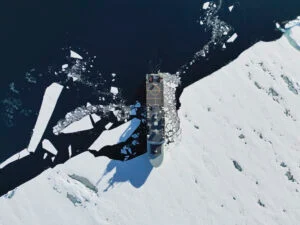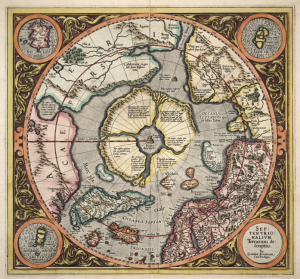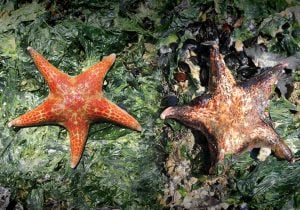
People & Culture
On thin ice: Who “owns” the Arctic?
As the climate heats up, so do talks over land ownership in the Arctic. What does Canadian Arctic Sovereignty look like as the ice melts?
- 4353 words
- 18 minutes
This article is over 5 years old and may contain outdated information.
Science & Tech

A much-anticipated, $17 million study on the effects of climate change in the Arctic has been partly cancelled due to, well, the effects of climate change.
Timing was crucial for the four-year Hudson Bay System Study (BaySys), which involved 40 scientists from across Canada and seeks to understand the mixed impacts of freshwater regulation and climate change in Hudson Bay. The University of Manitoba-led expedition was scheduled to launch from aboard the research icebreaker CCGS Amundsen. But when unusually severe ice conditions floated southward into the Strait of Belle Isle and along the northeast coast of Newfoundland, the Canadian Coast Guard (which operates the icebreaker) had to keep the ship in area for critical search and rescue operations. The extra time spent in the south meant the ship would arrive in Hudson Bay too late to meet research objectives, and the first leg of the 2017 expedition was cancelled. The second leg is set to begin on July 6.
“A second week of delay meant our research objectives just could not be safely achieved,” says David Barber, expedition chief scientist and BaySys scientific lead. “The challenge for us all was that the marine ice hazards were exceedingly difficult for the maritime industry, the CCG, and science.”
The warming climate has caused Arctic sea ice to become increasingly thin and sparse, meaning strong winds can easily push it south at this time of year.
But it’s not all bad news: Barber and the rest of the Sea Ice Research Team were able to use the scientific equipment already aboard the Amundsen to collect data on the physics of the ice, ocean and atmosphere in the area. This information will help scientists understand what happened and make Canada better prepared for climate change-driven increases in marine ice hazards.
Are you passionate about Canadian geography?
You can support Canadian Geographic in 3 ways:

People & Culture
As the climate heats up, so do talks over land ownership in the Arctic. What does Canadian Arctic Sovereignty look like as the ice melts?

People & Culture
In this essay, noted geologist and geophysicist Fred Roots explores the significance of the symbolic point at the top of the world. He submitted it to Canadian Geographic just before his death in October 2016 at age 93.

Environment
As the impacts of global warming become increasingly evident, the connections to biodiversity loss are hard to ignore. Can this fall’s two key international climate conferences point us to a nature-positive future?

Environment
The uncertainty and change that's currently disrupting the region dominated the annual meeting's agenda